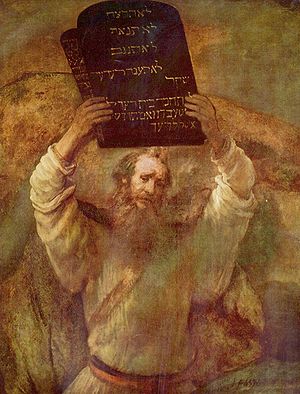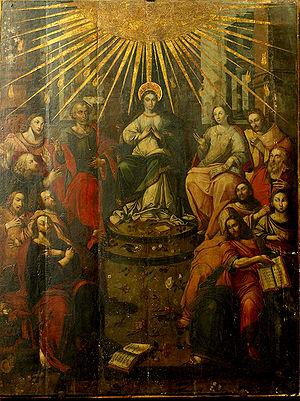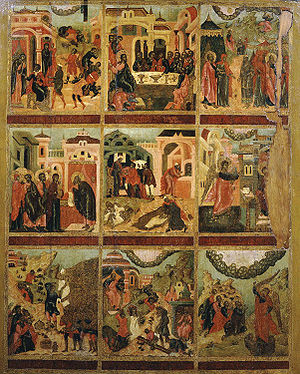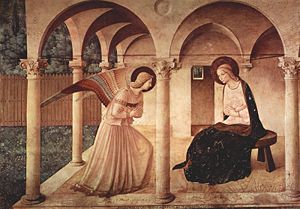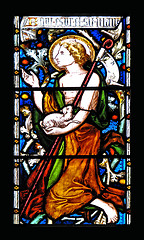The Virgin Mary’s February, 2011 messages focus on perfecting prayer and working towards converting our hearts and minds toward God. Mary offers Her assistance to anyone who asks for it.
Our Lady’s message to Mirjana Soldo on February 2, 2011
Dear children; You are gathering around me, you are seeking your way, you are seeking, you are seeking the truth but are forgetting what is the most important, you are forgetting to pray properly. Your lips pronounce countless words, but your spirit does not feel anything. Wandering in darkness, you even imagine God Himself according to yourselves, and not such as He really is in His love. Dear children, proper prayer comes from the depth of your heart, from your suffering, from your joy, from your seeking the forgiveness of sins. This is the way to come to know the right God and by that also yourselves, because you are created according to Him. Prayer will bring you to the fulfillment of my desire, of my mission here with you, to the unity in God’s family. Thank you.
Mary’s message does not focus on any particular mystery of the rosary, but praying the rosary in general. I know that many of us have a difficult time remaining focused while praying. We tend to go into “auto pilot” where we recite the words of the prayers but think about other things. I know that I often start thinking about scenes from movies, television shows, or something else I saw or heard. Or, thinking about an intention I have may inadvertently sidetrack me. I might begin a decade by praying for all those driving to work; that they remain safe in their travels. I then start thinking about my car. “When did I last take it in for service? What did the mechanic find? How much did he charge me? What’s that squealing noise? I should remember to have that checked out.” And the next thing I know, I’ve blown through the entire decade without even realizing it.
Mary asks us to really focus on the quality of our prayer. I’ve mentioned this before about trying to find perfect prayer. Here’s a tip when you find yourself mindlessly reciting words — STOP PRAYING! Take a few seconds to clear your mind of those distracting thoughts. Then pick up that rosary and start praying again with renewed focus. Possibly that day just is not a good day for focused prayer. There’s no shame in realizing that you are too distracted to really give God your full attention. Just resolve that you will try again later with renewed vigor. If Mary’s tone in Her message is any indication, I think God prefers one sincere prayer over one hundred mindless recitations.
Our Lady’s message on February 25, 2011
Dear children! Nature is awakening and on the trees the first buds are seen which will bring most beautiful flowers and fruit. I desire that you also, little children, work on your conversion and that you be those who witness with their life, so that your example may be a sign and an incentive for conversion to others. I am with you and before my Son Jesus I intercede for your conversion. Thank you for having responded to my call.
Mary asks us to act as a “sign and an incentive for conversion to others” by the example we set. The Gospel from February 6, 2011 echos that same sentiment when Jesus asks us to be a light to the world of His love and goodness. Mary asks us to focus on our conversion by walking the path Jesus lays before us instead of the one the world shows us. I know that Jesus’ path can look difficult and scary at times. He puts down a pretty grand challenge by asking us to be perfect.
The good news is that we do not travel that path alone. Mary, through The Assumption, offers Her assistance. She looks down from Heaven to help us walk that road. She gave us the rosary, one of the strongest prayer tools in our spiritual arsenal. She gives us messages in the form of apparitions to steer us in the right direction. She spends all Her time an energy trying to put as many of us on the right path towards Heaven and She will never be too busy to help those who need it. So take up that challenge of praying and living perfectly as Jesus asks. You will never achieve perfection (after all, we are imperfect beings), but you will be a much better person and deeper in God’s grace than if you never tried at all.
Related articles
- Meditation – The Foundation of Mental Prayer (catholicjules.net)
- Catholics and their Rosaries :: Catholic News Agency (CNA (deaconjohnspace.wordpress.com)
- Children of Medjugorje, Newsletter of February 17, 2011 (deaconjohnspace.wordpress.com)
- Mary TV Daily Reflection 2/25/2011 (deaconjohnspace.wordpress.com)
- On The Rosary – Again! (mundabor.wordpress.com)









